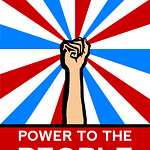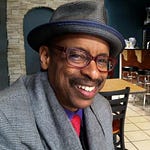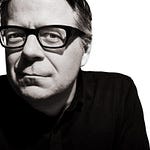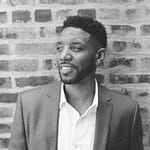vol. 3 issue 15
Greetings,
Continuing with our look at what we might have lost of ourselves and our traditions through the brutal, national acculturation process over the centuries, is this tender and provocative conversation with Delta David Gier and Emmanuel “Bull” Black Bear, two members of the Lakota Music Project.
Based in Sioux Falls, South Dakota, the project began in 2009 when Maestro Gier, artistic director of the South Dakota Symphony Orchestra, sought ways to serve the community at large. The result was a partnership with various members of the Sioux Nation, primarily those living on the Rosebud Reservation. Bull is a member of the Ogalala Sioux and is the leader of the Creekside Singers, a drumming and singing group from “the rez” that also now forms approximately half of the LMP’s total musicians.
Until the pandemic made performing impossible, at least for now, the LMP performed widely across the state, bringing their blended form of Western and indigenous music to audiences of all races, and in so doing, helping to effect inter-racial harmony throughout the region where racism against American Indians and indigenous skepticism of white “gringos” are prevalent.
I first was introduced to the LMP in 2019 when they performed here in Washington. I wrote about my experience attending this concert, and how it reminded me of time spent in Indian Country (and native Hawai’i as well), where time is a state of mind, not a linear construct to help us achieve progression from point A to point B.
How would it be possible, I wondered, to combine the music of a culture that responds to its environment, with the music of a culture that is predicated on controlling its environment? In fact, as both the maestro and Bull describe in this interview, it was not easy, but the difficulty was where they found their success. By putting aside egos and accepting that the point was less perfection than it was to build relationships, the LMP has created cultural bridges between the worlds of red and white, and still another bridge to a place where race is irrelevant: the place music takes us when language is limited.
It is in this place that the two leaders of their respective musical ensembles realized they shared the same goal. By assuming the mantle of what Gier calls “professional listeners”, together, he and Bull built trust in one another, their communities, and a way forward to peace an understanding that would not be possible without including the traditions of the past.
And that is why I think the LMP has much to teach us now, in this moment when our institutions have largely failed us all, rending our nation in tatters, leaving us to wonder how we ever will advance with a clear idea of how all the disparate parts of our multi-racial selves fit together.
My specific area of interest this year is in our traditional medicine, but it is deeper than that, as you likely have noted. My interest includes not just the ways we have traditionally treated illness in this country, but how the choices we have made around medicine and healing have never been in a vacuum, even when we have forgotten this fact.
We are never isolated, even when our commitment to what is shiny, fast, and novel might give us that impression. Instead, we either function within our environment, or become dysfunctional when we lose touch with our place within that environment.
I do not profess to have more than a neophyte’s appreciation for the sounds of native drumming and singing, and I am deeply reverent of my own Western musical traditions. Each moves me when I listen, but with different effects on how it engages my senses. Both ultimately will deliver me to a transcendent place, but the former is organic while the latter is measured.
As humans, we need both. It is our nature to make sense of things, to order and name them. But when we do so at the expense of remembering that ultimately, we are all connected to that which we parse, that nothing exists beyond the circular continuum of being, even if we are ingenious enough to lay it out on a timeline so we can experience it incrementally, then we come to believe the lie that we are separate. Our current legacy of healthcare demonstrates the expense and inefficiency of this approach.
The truth is, we are all connected, and we live within a world holistically. The need for reform is the evidence-based proof of how we have left too much of our elemental power behind in our focus on advancement. Jung might say it is time for us to look back now, and to retrieve the shadow of our former selves if we are to continue that advancement.
Dr. Victoria Sweet told us about how Slow Medicine is the way to exist and heal within the circle of life outside of the moments when the need for direct, acute response has passed. Physicians and healthcare systems that have access to both of these rhythms, I believe are the ones that are best equipped to treat and heal communities to their fullest, most complex potential.
It is this lesson in harmony and humility I was confident the LMP could offer us in our examination of what a compassionate and effective healthcare system of the future might look like. In my vision, it is a system of care that remembers we are all part of the environment, where each of us needs the right amount of rain, sunshine, fresh air, and nutritious food, a place where when we are denied that balance, we suffer and fail to thrive. My vision also recalls that while our modern health technologies are also essential – and inevitable, given that being human is to create and innovate – conquering and dominating the environment where we seek to effect healing is not.
We need both, but the importance of one – the ego, if you will – cannot precede the necessity and importance of the other.
Below are the video chapters in this short podcast/video.
Don’t forget, later this month (exact date TBA) —
Ensouled: the online journal of applied and cultural astronomy.
It’s an anthropological approach to humanity’s relationship to the heavens over the eons.
Also to come later this Spring…
I have begun conducting interviews with prominent members of the vanguard of psychedelic medical research. First up will be a truly provocative interview with Scott Aaronson, MD, clinical research director at Sheppard Pratt in Towson, Md., one of the nation’s oldest psychiatric facilities, and now home to the Center of Excellence for psychedelic medical research for treatment-resistant depression, sponsored by the mental health company, Compass.
There is a lot of debate in the venture capital community currently, as to whether there should be proprietary gains from therapeutic molecules found in nature, and I will address that in time, but my conversation with Dr. Aaronson centered on the implications of taking people on trips, so to speak, when the guides in charge might not be sure of how to navigate the mind-blown-wide-open terrain.
Thanks for reading and listening.
Peace,
Whitney
The Lakota Music Project Podcast and Video Chapter Markers:
0:00 Introduction
5:00 Partnership decision made to create better, more just world for Bull’s son
8:30 Difficulty to come in on just the right note
11:15 Music as a process of feeling, not counting
14:08 How two worlds come together
18:00 First you trust, then the music just happens
20:33 The marriage of two traditions improves the lives of those from each
28:21 Belief and faith in the process of each other brings integrity to all
30:55 The role of a “professional listener”
32:50 Music is what our souls hear and helps us thrive and heal
35:00 The death knell of music’s power is when it is commodified










